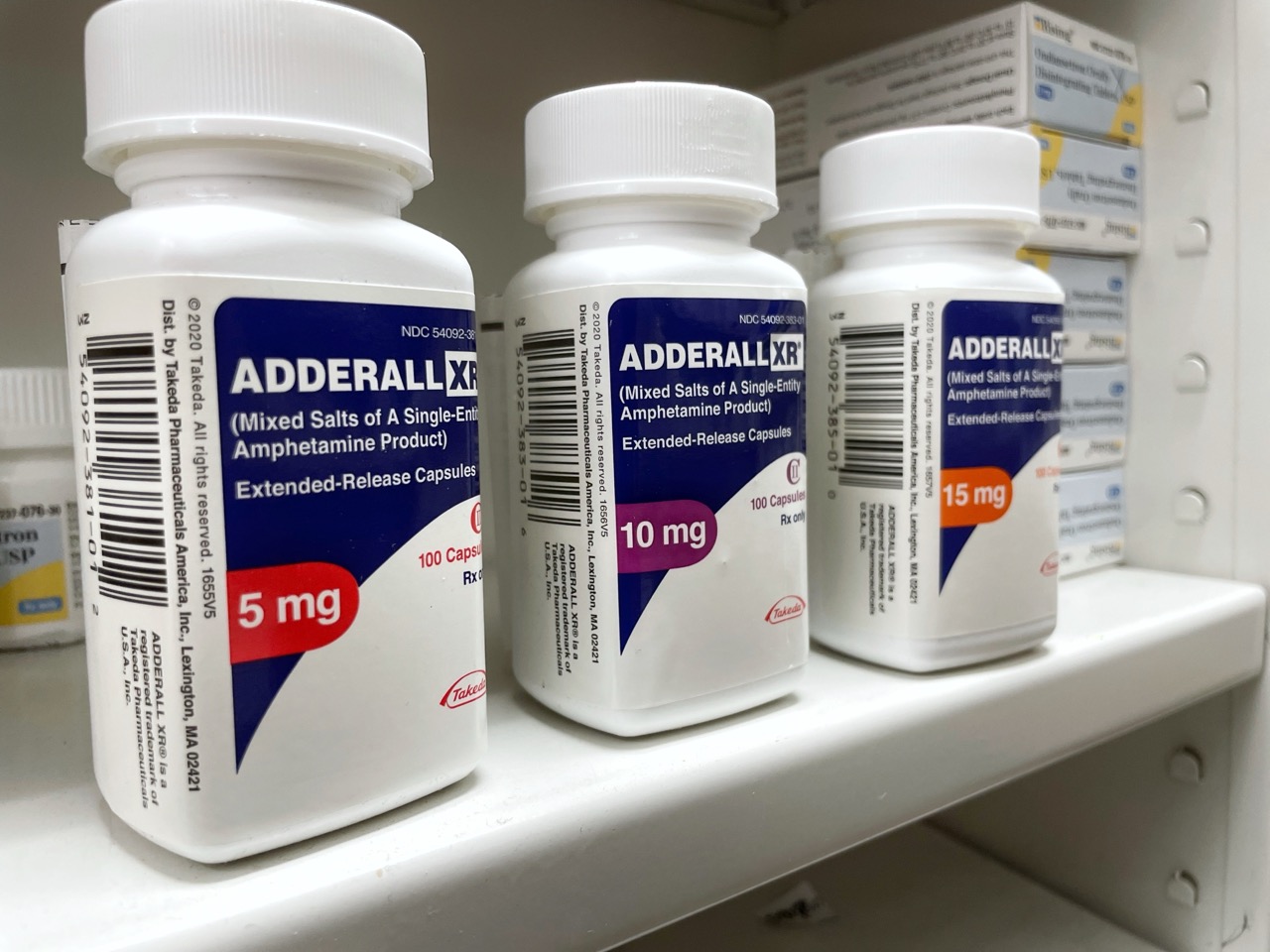Attention Deficit Hyperactivity Disorder (ADHD) & Stimulants
Stimulant medication is a class of psychiatric drugs, including amphetamines (e.g., Adderall) and methylphenidate (e.g., Ritalin), primarily used to manage ADHD symptoms and improve focus. While effective, concerns exist over side effects, long-term impact, and overprescription, especially in children diagnosed with ADHD.
Some view these medications as essential for enhancing focus and daily functioning, while others argue they mask underlying issues or create a risk of dependency. The decision to medicate is personal and should be based on factors such as age, symptom severity, and individual needs.

What is ADHD?
ADHD is a neurological condition characterized by persistent inattention, hyperactivity, and impulsivity. In 2022, the CDC estimated that 7 million U.S. children aged 3 to 17 (11.4%) and about 6% of adults had been diagnosed with ADHD. [1] Despite its prevalence, its exact cause remains uncertain.
Some attribute ADHD to genetics and brain structure differences, particularly in areas that regulate focus and impulse control. Others highlight environmental factors such as early childhood experiences, family dynamics, and nutrition. Some suggest it is not a disorder but a stress response formed when young children face overwhelming challenges. [2]
Regardless of its origins, ADHD symptoms affect daily life, relationships, academic performance, and career outcomes. [3] Understanding its complexity is essential for improving support, treatment, and awareness.
ADHD Diagnosis and Challenges
Children and adults diagnosed with ADHD often face misunderstanding, isolation, and frustration as they navigate daily challenges. Struggling to meet expectations in school, work, and social settings can lead to feelings of failure and inadequacy. Constant reminders to “try harder” or “pay attention” can reinforce the belief that their efforts are never enough.
For people with ADHD, maintaining friendships and engaging in conversations can be difficult, often leading to loneliness and rejection. Emotional dysregulation contributes to mood swings, frustration, and low self-esteem. Without proper support, many internalize their struggles, feeling incapable or overwhelmed. For some, medication becomes a tool to manage symptoms and improve quality of life.
Medication for Treating ADHD Symptoms
Treatment depends on age and individual needs. Medication is a common approach for managing ADHD, helping improve focus, impulse control, and daily functioning. Many choose medication for its quick and effective symptom relief. In the U.S., the FDA has approved two main types of ADHD medications: [4]
Stimulants are the most commonly prescribed for ADHD, working by increasing dopamine and norepinephrine levels to enhance focus, impulse control, and attention. While effective, they can cause side effects such as insomnia, appetite loss, and increased heart rate. These medications fall into two categories:
- Methylphenidate-based (e.g., Ritalin, Concerta, Daytrana)
- Amphetamine-based (e.g., Adderall, Vyvanse, Dexedrine)
Non-Stimulant Medications – Alternatives for those who cannot tolerate stimulants or have a history of substance misuse. These include:
- Norepinephrine reuptake inhibitor that improves focus and impulse control – Atomoxetine (Strattera)
- Medications originally for high blood pressure that help with impulsivity and hyperactivity – Guanfacine (Intuniv) and Clonidine (Kapvay)
Children Diagnosed with ADHD
The rising number of ADHD diagnoses has led to growing concerns about overlabeling and overmedication. In recent years, more children than ever have been diagnosed, raising questions about whether ADHD is being properly identified or if normal childhood behavior is increasingly pathologized.
Once labeled with ADHD, children often face a cycle of expectations that shape their experiences. They may be seen as disruptive or inattentive, reinforcing struggles with self-esteem and social acceptance. The pressure to manage symptoms often leads to medication as the default solution, despite ongoing debates about long-term effects. While ADHD can present real challenges, the increasing number of diagnoses raises important questions about how society defines and responds to neurodiversity.
Children and Stimulant Concerns
For children six and older, treatment often combines stimulant medication with behavior therapy. In 2024, 53.6% of children with ADHD in the United States were prescribed medication. Despite its widespread use, many parents worry about the long-term effects of stimulants.[5]
Key concerns include:
- Potential impact on brain development, liver function, and overall health
- Possible side effects such as:
- Elevated heart rate
- Increased blood pressure
- Sleep disturbances
- Appetite suppression
- Emotional changes
While stimulants can provide immediate relief from ADHD symptoms, the decision to medicate should carefully weigh both benefits and risks, with close monitoring by healthcare providers.
Medically Assisted Treatment for ADHD
Medication is one tool for managing ADHD, but long-term success depends on a well-rounded approach that includes behavioral strategies and environmental support. The decision to medicate should be based on individual factors, including:
- Age – Whether the individual is a child, adolescent, or adult
- Symptom severity – The intensity and frequency of symptoms
- Specific symptoms – Some medications are more effective for inattention, others for hyperactivity or impulsivity
- Medical history – Pre-existing conditions or past reactions to medications
- Response to previous treatments – Success or side effects from prior medications
- Impact on daily life – How ADHD affects school, work, relationships, and overall well-being
Deciding whether to treat children diagnosed with ADHD with stimulant medication is a complex decision. Unlike adults, children are still developing, making it essential to carefully assess the long-term effects. While medication can provide quick symptom relief, it does not address underlying behavioral and emotional challenges. Lasting improvement comes from identifying root causes and integrating therapy, skill-building, and lifestyle adjustments.
Non-Medical Approaches to Managing ADHD Symptoms
While medication is a common approach, it is not the only way to manage ADHD. Many individuals benefit from a combination of behavioral therapy, lifestyle changes, and environmental support to improve focus, emotional regulation, and overall well-being.
Behavior Therapy
Behavior therapy helps develop coping strategies, improve self-control, and reinforce positive behaviors.
For adults, Cognitive Behavioral Therapy (CBT) is a goal-oriented approach that addresses negative thought patterns and helps manage impulsivity, improve focus, and regulate emotions.
For children, behavior therapy includes parent and teacher training to create structured environments with clear expectations, rewards, and consistent discipline, helping children build routines and self-regulation skills.[6]
Wellness Tip: Encouraging movement breaks throughout the day, such as stretching, jumping jacks, or a short walk, can help children with ADHD release excess energy and improve focus on tasks.
Lifestyle Changes
Long-term strategies for managing ADHD symptoms, including diet, sleep, and physical activity, play a key role in symptom control and overall well-being.
- Nutritious Diet – A balanced intake of protein, healthy fats, and complex carbs supports brain function, while reducing sugar helps prevent energy crashes and hyperactivity.
- Sufficient Sleep – Poor sleep worsens focus, impulse control, and emotional regulation, making a consistent sleep schedule essential.
- Supplements – Omega-3, zinc, and magnesium may support brain function and emotional stability.
- Physical Activity – Exercise boosts dopamine and norepinephrine levels, helping reduce hyperactivity and improve focus.
- Nature Exposure – Spending time in nature lowers stress and anxiety, improving emotional regulation.
While stimulant medications can help with focus and impulse control, building self-regulation skills through lifestyle changes is essential for long-term success. [7]
Wellness Tip: Break tasks into smaller, manageable steps to prevent feeling overwhelmed and improve focus.
Managing ADHD Symptoms
Managing ADHD effectively goes beyond medication, requiring adjustments in daily routines, learning environments, and workplaces. Simple changes can help individuals improve focus, regulate emotions, and navigate daily challenges more effectively. Accommodations in school, the workplace, and personal life provide essential support, making tasks more manageable and reducing stress. [8]
At School
- Extended time on assignments and exams to reduce pressure.
- Breaks during lessons to release excess energy and maintain focus.
- Preferential seating near the teacher or away from distractions.
- Use of technology like voice recorders or laptops for note-taking.
- Clear, structured instructions with visual aids and step-by-step breakdowns.
In the Workplace
- Flexible work hours or remote work options to improve productivity.
- Clear communication with written instructions and meeting summaries.
- Regular feedback and check-ins to keep tasks on track.
- Reducing distractions by creating a quiet workspace.
In Daily Life
- Routine and structure to reduce anxiety and improve organization.
- Positive reinforcement to boost confidence and encourage progress.
- Supportive relationships that support understanding and open communication.
Wellness Tip: By combining behavioral strategies, lifestyle changes, and reasonable adjustments, individuals with ADHD can build skills that enhance their ability to manage symptoms and thrive in various aspects of life.
A Balanced Life
Managing ADHD requires a personalized approach that balances medical treatment, behavioral strategies, and lifestyle adjustments. While medication can improve focus and impulse control, long-term success depends on developing coping skills, creating supportive environments, and understanding the unique challenges ADHD presents.
For both children and adults, structured routines, clear expectations, and emotional support play a vital role. Encouragement, patience, and access to the right resources help individuals with ADHD navigate daily life more effectively.
By increasing awareness and reducing stigma, society can create a more welcoming environment where individuals experiencing ADHD symptoms feel recognized, supported, and empowered to reach their full potential.
- Centers for Disease Control and Prevention. Data and Statistics on ADHD. Centers for Disease Control and Prevention, 2021, www.cdc.gov/adhd/data/index.html. Accessed 6 Mar. 2025.
- Komisar, Erica. “Child Attachment Expert: Hidden Dangers of Daycare, It Might Be Causing Future Issues for Your Kid! Birth Rates Are Plummeting & It’s Terrifying!” The Diary of a CEO with Steven Bartlett, 2025, open.spotify.com/episode/0vXjbmobEhSX0p0REMkEVo. Accessed 6 Mar. 2025.
- National Institute of Mental Health. Attention-Deficit/Hyperactivity Disorder: What You Need to Know. National Institutes of Health, 2021, www.nimh.nih.gov/health/publications/attention-deficit-hyperactivity-disorder-what-you-need-to-know. Accessed 6 Mar. 2025.
- National Center for Biotechnology Information. “Attention Deficit Hyperactivity Disorder.” Bookshelf, U.S. National Library of Medicine, 2020, www.ncbi.nlm.nih.gov/books/NBK606341/. Accessed 6 Mar. 2025.
- Centers for Disease Control and Prevention. “ADHD Treatment.” Centers for Disease Control and Prevention, 2023, www.cdc.gov/adhd/treatment/index.html. Accessed 6 Mar. 2025.
- “NHS Website.” NHS, 2023, www.nhs.uk/conditions/attention-deficit-hyperactivity-disorder-adhd/treatment/. Accessed 6 Mar. 2025.
- Lai, Kimberly Y., et al. “Long-term Effects of Stimulant Medication in ADHD: A Comprehensive Review.” PubMed Central, U.S. National Library of Medicine, 2023, https://pubmed.ncbi.nlm.nih.gov/11322742/. Accessed 6 Mar. 2025.
- Muenke, Michael, et al. “Attention Deficit Hyperactivity Disorder (ADHD) and Its Long-Term Impact on Criminal Behavior.” PMC, National Library of Medicine, 2012, https://pmc.ncbi.nlm.nih.gov/articles/PMC3398051/. Last accessed 6 Mar. 2025.
Our Medical Affairs Team is a dedicated group of medical professionals with diverse and extensive clinical experience who actively contribute to the development of our content, products, and services. They meticulously evaluate and review all medical content before publication to ensure it is medically accurate and aligned with current discussions and research developments in mental health. For more information, visit our Editorial Policy.
MentalHealth.com is a health technology company guiding people towards self-understanding and connection. The platform provides reliable resources, accessible services, and nurturing communities. Its purpose is to educate, support, and empower people in their pursuit of well-being.
Dr. Allan Schwartz is a medical writer with over 30 years of clinical experience as a Licensed Clinical Social Worker. He writes about various mental health disorders, eating disorders, and issues related to relationships, stress, trauma, and abuse.
Dr. Jesse Hanson is a somatic psychologist with a PhD in Clinical Psychology and 20+ years of neuropsychology experience.
Further Reading
Our Medical Affairs Team is a dedicated group of medical professionals with diverse and extensive clinical experience who actively contribute to the development of our content, products, and services. They meticulously evaluate and review all medical content before publication to ensure it is medically accurate and aligned with current discussions and research developments in mental health. For more information, visit our Editorial Policy.
MentalHealth.com is a health technology company guiding people towards self-understanding and connection. The platform provides reliable resources, accessible services, and nurturing communities. Its purpose is to educate, support, and empower people in their pursuit of well-being.


